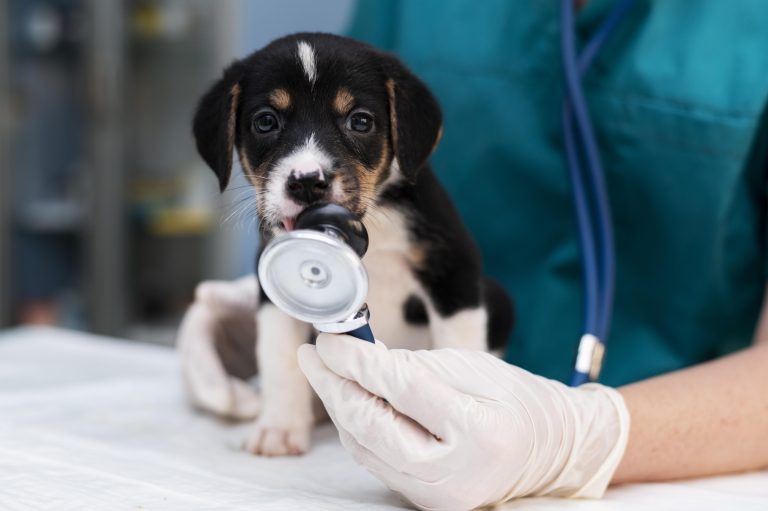Feeding dogs with kidney diseases must be carefully chosen so that they can benefit from the positive effects on their health.
Kidney disease in dogs is a common condition and can be caused by a variety of factors such as improper diet, age, genetic predisposition, or pre-existing health conditions. If your dog is diagnosed with kidney disease, it is important to adjust its diet to reduce stress on the kidneys and maintain its health.
A proper diet can help maintain your dog’s hydration levels, electrolyte balance, and nutritional status, as well as manage other health conditions such as high blood pressure or diabetes.
In this article, we’ll explore what dogs with kidney disease should eat and what to avoid. We will discuss recommended foods and foods to avoid, as well as their benefits for kidney health and the whole body.
CONTENT:
- Feeding dogs with kidney disease: What to include in the diet
- What to avoid
- Tips for feeding dogs with kidney disease
Feeding dogs with kidney diseases: What to include in the diet
When a dog suffers from kidney disease, kidney function is impaired and the kidneys can no longer efficiently remove waste and excess nutrients from the blood. In this case, diet plays an important role in maintaining the dog’s health and well-being.
- A proper diet can help reduce pressure on the kidneys and slow the progression of kidney disease. In general, a diet for dogs with kidney disease should be low in protein and phosphorus, but contain enough essential nutrients and be easy to digest.
- Protein is important for tissue growth and repair, but dogs with kidney disease cannot efficiently eliminate protein waste. Therefore, the diet should be limited in protein, but contain high-quality, easily digestible proteins, such as those from chicken, turkey, or fish. Food for dogs with kidney disease should contain about 14-18% protein.
- Phosphorus is an essential mineral for healthy bones and teeth, but when the kidneys aren’t working properly, phosphorus levels in the blood can rise. This can lead to complications such as weight loss, gastrointestinal problems, and damage to the dog’s health. Therefore, the diet must be limited in phosphorus and contain moderate amounts of this mineral.
- Other essential nutrients, such as omega-3 fatty acids and antioxidants, can help reduce inflammation and support kidney health. These nutrients are found in foods such as salmon, tuna, fish oil, fruits, and vegetables. A balanced diet should also contain carbohydrates and soluble fiber to provide energy and help control blood glucose levels.
What to avoid
If your dog suffers from kidney disease, there are certain foods you should avoid. These include:
- Protein-rich foods: Red meat, fatty meats, organ meats, and other protein-rich foods can put extra strain on the kidneys and make the disease worse. It is important to limit protein intake to reduce stress on the kidneys.
- Foods high in phosphorus: You should avoid dairy products and other foods high in phosphorus. High phosphorus can worsen kidney disease and lead to complications.
- High-sodium foods: You should avoid processed food and other high-sodium foods. High sodium can worsen blood pressure and be harmful to the kidneys.
- High-fat foods: Fatty meats and fried foods can be difficult to digest and can worsen the health of a dog with kidney disease. It is important to avoid high-fat foods and opt for low-fat foods.
In general, the diet of a dog with kidney disease should be balanced, easy to digest, and contain all the essential nutrients that the dog needs.
Tips for feeding dogs with kidney diseases
If your dog suffers from kidney disease, it is important to provide a proper diet to improve his health and slow the progression of the disease. Here are some helpful tips for feeding dogs with kidney disease:
- Consult Your Veterinarian: Before starting a diet for your dog, consult your veterinarian. The vet will determine your dog’s specific dietary needs and discuss diet options. Also, make sure your vet is monitoring your dog’s health and adjusting the diet accordingly as the disease progresses.
- Choose quality food: Quality food can help ensure your dog gets the essential nutrients it needs. It also can reduce stress on the kidneys. Choose a food that has a limited amount of protein, but is rich in omega-3 fatty acids and antioxidants.
- Avoid foods high in protein and phosphorus: You should limit the protein and phosphorus in the diet of dogs with kidney disease. Choose foods that contain high-quality protein, but in limited amounts, and avoid foods high in phosphorus, such as dairy products.
- Control the sodium levels: Foods high in sodium can worsen blood pressure and can be harmful to the dog’s kidneys. Avoid processed foods and salty foods and choose foods with moderate amounts of sodium.
- Stay hydrated: Hydration is important to keep your kidneys healthy and prevent dehydration. Make sure your dog has access to fresh, clean water and can drink water whenever he needs it.
- You need to monitor food intake and weight: You need to control The amount of food your dog eats. The excess food can put extra strain on the kidneys. Also, monitor your dog’s weight to prevent obesity, which can worsen kidney health.
In conclusion, a proper diet can help improve the health of dogs with kidney disease. Also, this can slow the progression of the disease. It is important to consult your vet before starting a diet and to monitor your dog’s health.

